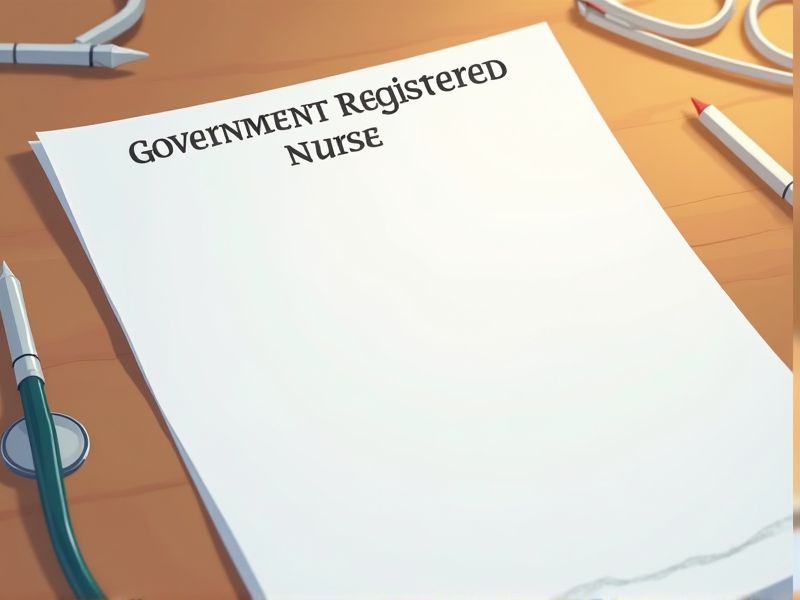
Government registered nurses require specific certifications because these validate their expertise and capability to provide quality healthcare. Such certifications ensure adherence to the standards of medical practice, which is crucial for patient safety and effective service delivery in public health settings. They also help healthcare institutions maintain compliance with regulatory requirements, enhancing the overall reliability of the healthcare system. Here are some important certifications you may need as a Government Registered Nurse.
Registered Nurse (RN) License
A Registered Nurse (RN) license ensures that individuals meet necessary educational and professional standards, directly impacting patient safety and care quality. Without an RN license, a nurse cannot legally practice, which could compromise healthcare delivery in government facilities. Licensing enforces a uniform standard that influences public trust and confidence in the healthcare system. The license also facilitates inter-state practice and collaboration, crucial for nationwide health initiatives.
Basic Life Support (BLS) Certification
Government Registered Nurses with BLS certification are better equipped to provide immediate and effective assistance during cardiovascular and respiratory emergencies, enhancing patient survival rates. Healthcare facilities with BLS-certified staff meet regulatory standards, which can influence funding and accreditation status. Nurse competency in life-saving techniques builds trust with patients and their families, improving overall healthcare experience. BLS certification ensures nurses are updated on the latest emergency care protocols, promoting higher standards of care.
Advanced Cardiac Life Support (ACLS) Certification
ACLS certification ensures that government registered nurses possess the necessary skills to respond effectively to cardiac emergencies, which improves patient survival rates. Hospitals and healthcare facilities often require ACLS certification for compliance with national health standards and accreditation processes. Training in ACLS prepares nurses to work seamlessly with emergency response teams, crucial in high-stakes situations such as cardiac arrest. Certification demonstrates commitment to professional development, increasing a nurse's employability and career advancement opportunities.
Pediatric Advanced Life Support (PALS) Certification
Government Registered Nurses often encounter pediatric emergencies, requiring specialized skills to manage these critical situations effectively, leading to the necessity for Pediatric Advanced Life Support (PALS) Certification. This certification equips nurses with the ability to recognize and respond to respiratory distress, shock, and cardiac arrest in children and infants, which enhances patient care and outcomes. The knowledge and techniques gained from PALS align with healthcare standards and protocols, ensuring compliance with governmental regulations and guidelines. Patient safety and competence in pediatric care increase when nurses are certified, reducing the risk of medical errors during emergencies.
Trauma Nursing Core Course (TNCC) Certification
Obtaining TNCC certification equips government-registered nurses with specialized skills crucial for effectively managing trauma patients, enhancing their ability to provide high-quality care in emergency situations. By standardizing trauma care practices among nurses, TNCC helps reduce variability in patient outcomes, leading to improved recovery rates and patient satisfaction. Facilities holding trauma designation often require TNCC certification for their nurses, ensuring compliance with national healthcare guidelines and improving institutional accreditation prospects. TNCC-certified nurses can more effectively collaborate within interdisciplinary teams, as they possess a common language and understanding of trauma protocols, fostering better communication and teamwork in high-pressure environments.
Critical Care Registered Nurse (CCRN) Certification
Critical Care Registered Nurse (CCRN) Certification enhances a nurse's expertise in handling critically ill patients, aligning with the government's aim for high-quality healthcare services. Certification offers formal validation of a nurse's advanced skills, ensuring standardized patient care in government healthcare facilities. It equips nurses with up-to-date knowledge and practices, reducing the incidence of medical errors and improving patient outcomes. Many government positions require or prefer certification, as it assures stakeholders of the nurse's dedication to continuous professional development.
Certified Emergency Nurse (CEN) Certification
The Certified Emergency Nurse (CEN) certification enhances a nurse's expertise in handling emergency situations, leading to improved patient outcomes and heightened trust within healthcare settings. Government-registered nurses with CEN certification often possess advanced skills in critical care, facilitating efficient patient management during crises. This certification can lead to greater career advancement opportunities, as it distinguishes a nurse's commitment to continuous professional development. Hospitals and government healthcare agencies may prioritize hiring or promoting CEN-certified nurses, impacting employment prospects and job security positively.
Infection Control Certification (CIC)
The Infection Control Certification (CIC) provides nurses with specialized knowledge essential for implementing effective infection prevention strategies, directly contributing to improved patient outcomes. Government regulations often mandate such certifications to ensure consistent and high standards of healthcare practices across institutions. In hospitals, certified nurses play a crucial role in reducing infection rates, which in turn decreases healthcare costs and protects public health. Possessing a CIC enhances a nurse's professional credibility, advancing their career and ensuring alignment with national healthcare goals.
Disaster Preparedness Certification
Increased natural disasters and public health emergencies require nurses to possess specialized knowledge to respond effectively. Disaster Preparedness Certification equips nurses with skills to manage crises, ensuring they provide optimal care under pressure. Government mandates often demand standardized competencies across healthcare professionals to maintain public safety. Such certification enhances collaboration among professionals, streamlining disaster response efforts.
Nurse Executive Certification (NE-BC)
Nurse Executive Certification (NE-BC) enhances leadership skills and validates expertise in nurse management, crucial for registered nurses within government settings. This certification aligns with the demand for strategic leadership in public healthcare systems, improving the coordination and delivery of services. Certified nurses often drive higher standards of practice and policy implementation, directly influencing positive patient outcomes. It also reflects an ongoing commitment to professional development, which is valued in government positions.
Summary
You can anticipate enhanced job prospects as a Government Registered Nurse acquiring additional certifications often leads to increased opportunities in specialized fields. These certifications may enable access to higher salary brackets and improved job security. You will likely experience increased professional recognition and credibility within the healthcare community. Often, patient care outcomes improve as new skills and knowledge directly influence service quality.
